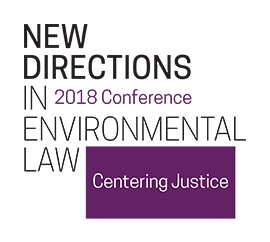Centering Justice: 2018 New Directions in Environmental Law Conference
We are bringing together speakers and participants passionate about fighting environmental racism, indigenous rights, healthy lands and water, youth organizing, climate justice, animal rights, creative activism, and gender equity.
The New Directions in Environmental Law Conference (NDEL) is an annual conference jointly hosted by Yale Law School (YLS), the Yale School of Forestry and Environmental Studies (F&ES), and the Yale Environmental Law Association (YELA). This year’s conference will take place at Yale Law School on Saturday, March 3, 2018.
We’re putting justice at the center of this year’s NDEL conference, with our theme of “Centering Justice.” Given that our movement toward an equitable global society and thriving earth must be grounded in community, “NDEL 2018: Centering Justice” will provide a space for energizing our work through the principles of anti-oppression, intersectionality, and coalition- building. We invite you to join us.
We would love to hear from you and read your proposals. We’re focusing on justice, and we want everyone here – particularly people who haven’t attended the conference before or haven’t been to Yale.
We are looking for proposals for a keynote panel and breakout sessions.
The keynote panel will be a highlighted feature of the conference. A successful keynote panel proposal will include experienced speakers with a deep commitment to justice and a topic of interest to the majority of conference attendees.
Breakout sessions may be in the form of a panel, an individual speaker, or as a skills workshop. These sessions will be held in smaller classrooms to encourage conversation and interaction between speakers and audience members.
Session proposals will be accepted on all themes and content areas. While we’ve provided sample topics below, we value thematic creativity. Successful proposals will include a law or policy component and will feature diverse speakers. Session organizers are encouraged to describe how their panelists will critically engage each other, central ideas and problems in their field, and the conference themes broadly.
Possible session topics include:
- Labor movement, farm workers, and environmental justice
- Just transitions to renewable energy futures
- Climate adaptation and resilience
- Civil rights and environment justice
- Immigration reform and environmental justice
- Tribal and indigenous sovereignty
- Gender and the environment
- Youth and future generations/intergenerational justice
- Arts and justice
- Local government, states, and resilient cities
- Climate justice
- Fostering diversity in environmental organizations
- Community-based resistance (e.g. fracking, pipeline resistance)
- Religion/ethics and environmental justice
- Public health and environmental justice
All sessions should be 75 minutes in length. For your reference, the conference agenda for 2017 is located here.
To submit a proposal, please include the following information in an email or attached document and send it to ndel@yale.edu by November 15, 2017. Successful proposals will be notified in early December. All successful proposals will be given a budget for panelist/speaker travel reimbursement.
We encourage community-based organizations to apply.
Questions can be directed to Leehi Yona, Program Chair, at leehi.yona@yale.edu or (603) 277- 1183.
What You Need to Submit:
- Name(s) of session coordinator(s): Email
- Phone
- Affiliation
- Session Title
- Session Description (max 250 words)
- Please explain how the session relates to the NDEL 2018 theme, Centering Justice (max 100 words)
- Panelists and workshop leaders (names, titles, affiliations, cities of residence/work): Estimated budget for speaker travel
- Will you be applying for funding to cover speaker travel and lodging? If so, please describe in detail
- If there is anything else you need to share (special accommodations, etc.), please do so (max 250 words)
